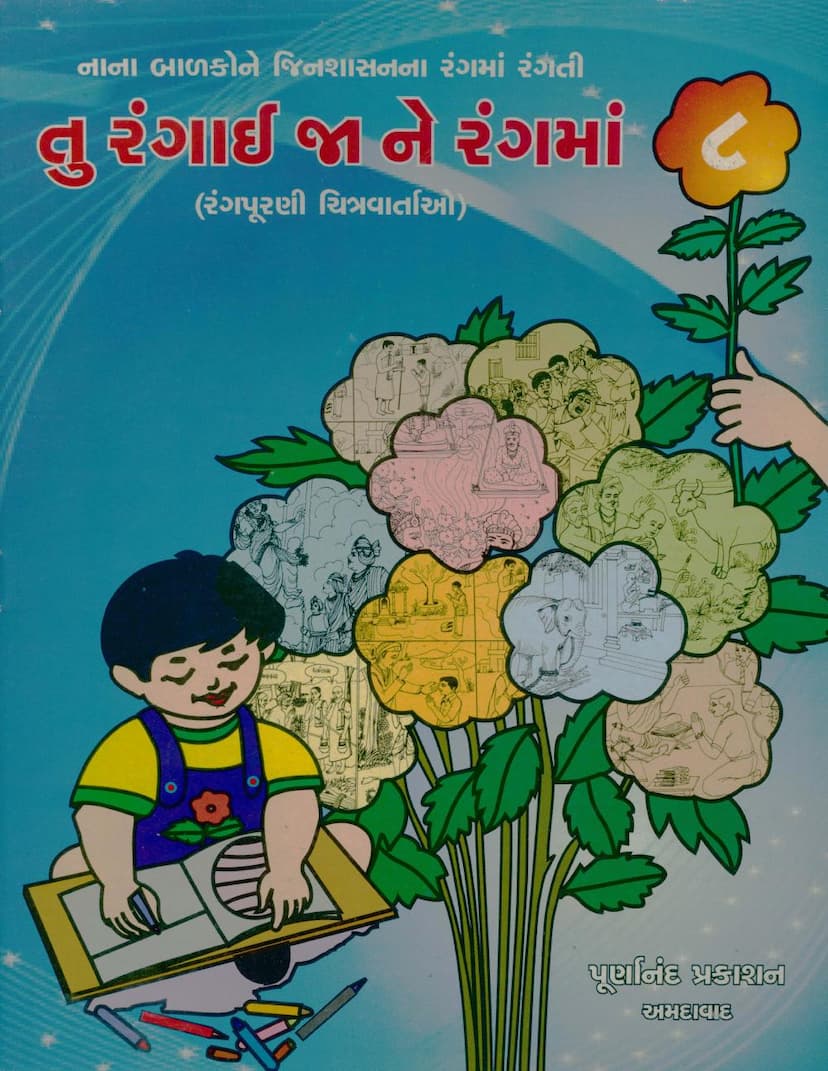Tu Rangai Jane Rangma 08
Added to library: September 2, 2025

Summary
This Jain text, "Tu Rangai Jane Rangma 08" (You Get Dyed in Color 8), published by Purnanand Prakashan, is part of a series designed to impart Jain religious and ethical values to young children through stories and coloring activities. This particular booklet (part of an eight-book series) uses 64 stories and 64 illustrations to educate children.
The booklet contains a competition (Prashna No. 8) with eight questions, encouraging children to answer based on the content of booklet number 7 (though the specific answers are provided within this booklet). The aim is to enrich children's lives with cultural colors, utilize time effectively, develop artistic skills, and make their childhood beautiful and virtuous. The publisher hopes that the children will live lives inspired by Jain principles and become role models for others.
The booklet then lists the lucky winners from previous competitions (numbers 5, 6, and 7) and provides instructions for participating in the current competition, emphasizing that answers should be on a postcard, in one word, and include the child's name, full address, and member number. The last date for submission for this competition was March 31, 2010.
Following this, the booklet features several short stories and moral lessons:
-
"Dharmne Mahatva Apje" (Give Importance to Religion): This story highlights a young, intelligent, and ambitious mechanical engineer who, despite financial struggles and a booming business, refuses a lucrative offer that would lead to widespread harm. Guided by his parents' religious upbringing and the teachings of his Guru, he prioritizes his dharma over wealth, refusing to design machinery that would cause mass killings. The moral is to prioritize religion over wealth and that unwavering faith leads to success.
-
"Aalambanni Asar" (The Effect of Association): This story illustrates the power of good association through the example of a king's brave elephant. During the monsoon, the elephant was housed near a Jain monastery. The constant exposure to the virtuous conduct and compassionate practices of the Jain monks (sadhu bhagwantos) transformed the elephant, making it peaceful and kind. When later moved near an armory, its aggressive nature returned. The story emphasizes how positive associations can change even animals and encourages readers to stay in a good environment and see sadhus and sadhvis daily.
-
"Indra karta Badshah Motta" (The Emperor is Greater Than Indra): This story features Emperor Akbar and his witty minister Birbal. Akbar, seeking to assert his dominance, asks Birbal if he or Indra, the king of the heavens, is greater. Birbal cleverly uses a tale about Brahma creating their statues, with Akbar's being heavier, to prove Akbar's superiority. The moral is to use intelligence for the benefit of others and to think ahead about potential questions.
-
"Prabhav Prabhu na Havan Jal no" (The Influence of the Lord's Ablution Water): This story recounts the life of Acharya Abhaydevasuri, who contracted leprosy. Despite immense suffering and the temptation to renounce his life, he remained devoted to his spiritual practice. Shasan Devi (Chakreshwari Devi) appeared and guided him to a place where a cow daily offered milk. There, he found an idol of Parshvanath Bhagwan. Upon anointing himself with the water from the idol's ritualistic bathing, his leprosy was cured, and his body became radiant. He then went on to write commentaries on Jain scriptures. The lessons include accepting illness as a consequence of karma, practicing dharma with the human body, and understanding the separation of body and soul.
-
"Jain Balak no Vinay-Vivek" (The Etiquette and Wisdom of a Jain Child): This section emphasizes the importance of good conduct and respect within Jainism. It explains that being born into a Jain family is a result of great merit. The text stresses the significance of practicing ahimsa (non-violence) from birth. It then details the proper ways to greet various individuals – from deities and spiritual leaders to family elders and even non-Jains – differentiating between "Namo Jinana," "Michchhami Dukkadam," "Pranam," and "Jai Jinendra." The moral is that true Jain etiquette involves understanding the context and showing appropriate respect.
-
"Kathiyara ni Varta" (The Woodcutter's Story): This story tells of a poor but content woodcutter couple who, after receiving a religious discourse from Jain monks, take a vow never to take anything that isn't given to them, considering it theft. When a valuable jewel is placed on their path, the woodcutter covers it with dust to prevent his wife from being tempted. His wife's immediate response that any stolen item should be seen as mere dirt reinforces their commitment to the vow. The story teaches the importance of contentment, not taking what belongs to others, and viewing other people's possessions as insignificant.
-
"Ashuddh Mantra Path" (Incorrect Chanting of Mantras): This story illustrates the consequences of incorrect chanting. A Vidyadhar (celestial being) attempts to fly using a mantra but falls repeatedly because he misses a single letter. Abhaykumar, a wise prince with a special ability, helps the Vidyadhar by correcting his mantra. The moral is that even a small error in chanting or writing can diminish power or change meaning.
-
"Ashuddh Likhvathi Anarth Thay Chhe" (Writing Incorrectly Leads to Calamity): This story highlights the chaos caused by a scribe's error. A cotton merchant instructs his clerk to write to his in-laws, but the clerk mistakenly writes "died" instead of "went to Ajmer" and "crying" instead of "cotton." This leads to his in-laws believing he has died and mourning his supposed death. The story emphasizes the importance of accuracy in writing and speaking.
The final page lists several individuals and their contributions, often related to religious practices, donations, or achievements within the Jain community.
In essence, "Tu Rangai Jane Rangma 08" is an educational resource for Jain children, using engaging stories and a participatory approach to instill core Jain values like non-violence, truthfulness, contentment, respect, and the importance of righteous conduct in their lives.